Major fossil fuel companies and energy utilities have used their financial power to take control of key renewable energy lobby groups in Europe in an effort to slow the continent’s transition to clean energy, according to industry insiders.
Big energy firms such as Total, Iberdrola, E.On and Enel have together adopted a dominant position in trade bodies such as the European Wind Energy Association (EWEA) and European Photovoltaic Industry Association (EPIA). Their representatives now constitute a majority on both group’s boards.
Officials in EPIA were told to argue for a renewable-gas alliance as the answer to Europe’s energy security concerns, while EWEA lowered its 2030 clean energy ambitions by a third, according to ex-staffers, renewables experts and policy insiders. They argue that the more pro-gas stance influenced the 2030 climate targets adopted by EU governments last year.
“One of the advantages the fossils still have over renewables is capital and that is why they say that the perfect match is between renewables and gas,” the Green MEP Bas Eickhout told the Guardian. “The strategy is familiar. It ends with a fossil fuel takeover.”
With emissions roughly half that of coal, natural gas is often seen as a bridge to a low-carbon future. In the period to 2030, it could provide a flexible back-up for renewables, on windless or cloudy days.
“In the short to medium-term, gas and renewables together are an essential part of Europe’s energy make-up to guarantee security of supply,” Oliver Joy a EWEA spokesman said. “From a systemic point of view, gas and wind actually complement each other quite well.”
But scientists argue that a large majority of fossil fuels, including gas, will need to remain in the ground if we are to avoid dangerous climate change. “This is a clear choice that needs to be made. Putting gas at the same level as renewables risks displacing investments from renewables into gas, thereby locking in carbon emissions over a long period of time,” Wendel Trio, the director of Climate Action Network Europe.

In 2009, energy utilities and fossil fuels firms had been blindsided by the EU’s announcement of renewable energy targets for 2020. “Suddenly, it was a reality and their market shares were diminishing dramatically,” said one source in the renewable industry. “From being system-relevant, renewables were suddenly becoming system-dominant. The big companies decided that ‘if you can’t beat them, join them. And if you join them, slow them down so that you can survive in the market’.”
Perhaps the most striking result of the alleged fossil fuel takeover was its apparent influence of the renewable trade groups’ position on EU climate goals agreed by governments in 2014. EWEA had previously supported calls for a 45% renewables share in Europe’s energy mix by 2030 but as the issue came to a head last year, representatives of all the major corporates on its board – apart from Alstom – opposed a higher target than 30%, with Iberdrola, Enel and other utilities wanting no target at all.
“The secretariat were under quite a bit of pressure to not be too ambitious and be what they called ‘realistic’,” one source with knowledge of the debate told the Guardian.
EWEA compromised with a pitch for a binding 30% goal – followed rapidly by EPIA. A 27% target was eventually agreed by EU leaders, that countries could ignore.
EWEA loyalists maintain that they had little realistic choice once the positions of countries such as the UK and Poland became clear, and say that the 30% goal was a “logical progression” from the 2020 goals. But environmentalists believe that as a low opening gambit, it created a fait accompli by not pushing the politicians to be more ambitious.
“The renewable energy associations were not effective,” a commission source said. “The big utilities won that battle and steered it their way.”
Energy utilities and fossil fuel firms began moving into the renewable associations in 2010 as part of an intensifying effort to influence policy lobbying in Brussels, according to Brussels insiders.
In March 2011, the French oil and gas company, Total, bought a controlling share in the solar manufacturer, SunPower. That company’s marketing director, Oliver Schaefer, was elected as EPIA’s president two years later, while another Total executive, Arnaud Chaperon, became EPIA’s vice president.
In all, five of EPIA’s eight board members now represent big energy and chemical concerns, such as Enel, Dupont, and Wacker Chemie.
At the same time, the complexion of the organisations was changing. “Most [policy officers] were made redundant or left because they no longer fitted in. These were associations where people used to work for beliefs and with their hearts but now it’s all about big noise and big money,” said one source.
As security of supply concerns rose across Europe last year in response to the Ukraine crisis, Schaefer instructed EPIA officials to advocate gas as part of the energy security solution.
“It is true that EPIA has not been very outspoken on this topic,” one informed source said. “Oliver Schaefer put forward the line that the solar and wind sectors should see gas as a partner – a flexible technology that can serve as backup – for sure, he also wanted the association to say this.”
EPIA’s CEO James Watson, denied that any staff members had been told to advocate a partnership with gas on energy security. “EPIA believes that we need flexibility in the EU energy system and gas is a technology that can provide this,” he said.
Schaefer is politically and personally close to Thomas Becker, EWEA’s CEO since 2012, who former employees describe as dazzled by major corporate players.
“I think Becker brokered a deal with EWEA’s ‘lead sponsors’ – the major corporates – that fund it much more than the national wind associations,” an ex-staffer said. “They’ve become a lot more influential and that has an advantage in creating resources and the capacity to lobby. But, politically, there’s a price to pay for that.”
EWEA’s board structure, always finely balanced, tilted decisively in favour of big energy firms in recent years, he said. Fifteen firms such as Alstom and EDF now have seats on EWEA’s board, compared to just three national associations. In 2012, there had been 19 national associations on the board.
Becker himself told an EU conference last November that “renewables and wind cannot do it [the clean energy transition] alone. That’s an illusion, obviously. We need an energy mix much more broad. I, of course, see gas as something very interesting, combined with renewables.”
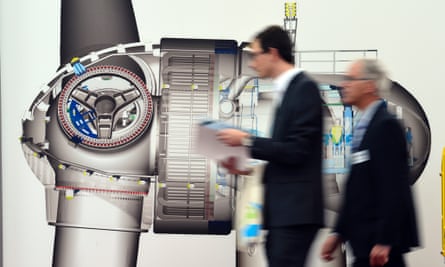
The wind association had previously argued that a 100% renewable energy future was possible (with beefed-up hydro-power storage) – and indeed necessary after 2030 – even if it was a little more expensive than an alliance with gas.
A EWEA spokesman declined to comment on whether the association still believed in a fully renewable post-2030 future, or whether a deal had been done with its lead sponsors.
“Originally gas was seen as a bridge technology for a few years but not a long-term solution and I think that may have changed in the public discourse,” a well-placed source said. “The gas people are interested of course. There has been a lot of pressure in EWEA’s board, especially since June to give a larger role to gas – mostly coming from the big utilities.”
EWEA did not respond to a request for comment on this allegation.
In the last year, EPIA and EWEA have been in regular talks with the lobby group, Gas Naturally about forming a common front. “There have been meetings with EWEA, EPIA and Gas Naturally at a high level with a view to making something together, whether in the form of a paper, an association or something else,” said one informed source.
In an interview last June, Schaefer said: “We are currently discussing whether it does not make sense to forge for a transitional period, an alliance between wind energy, photovoltaics and gas power plants, because it fits together simply, reflects the reality of the past 15 years, and technologically matches.”
Watson, a former director at the Weber Shandwick public relations firm, said that it was too early to speculate about the talks’ outcome, while a EWEA spokesman said that “no arrangements” with Gas Naturally were yet in place but the talks would go on.
A source said: “The strategy on the gas side would be to kill coal, and of course to greenwash. On the renewables side it would be to partner with big business rather than the small players and NGOS, as they did in the past, and conquer a bigger, more conservative and more powerful auditorium.”
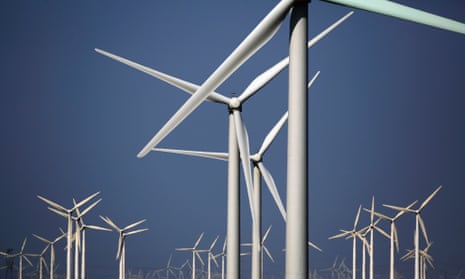

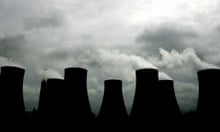
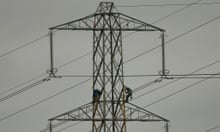
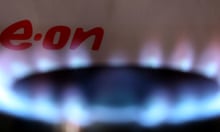
Comments (…)
Sign in or create your Guardian account to join the discussion